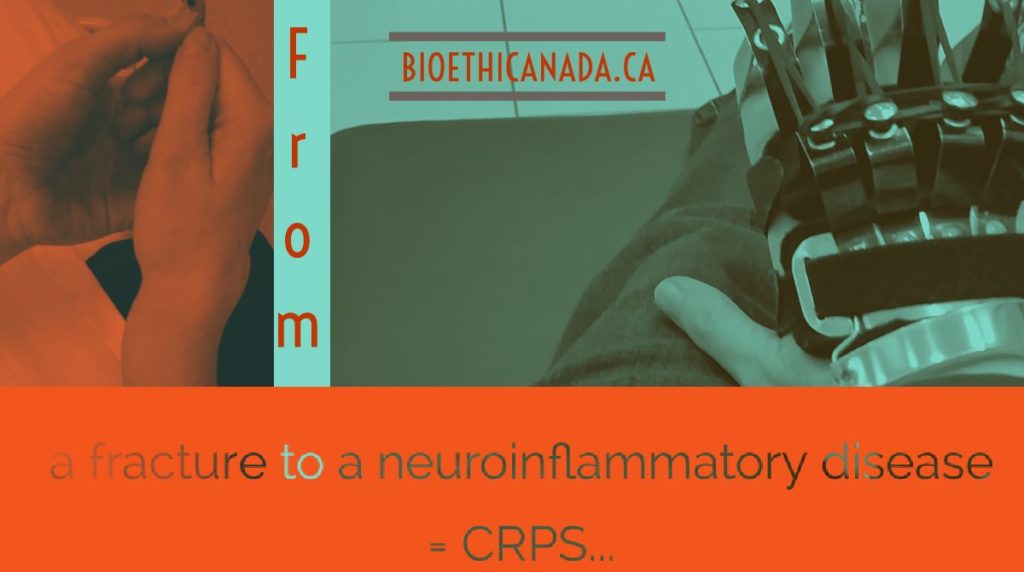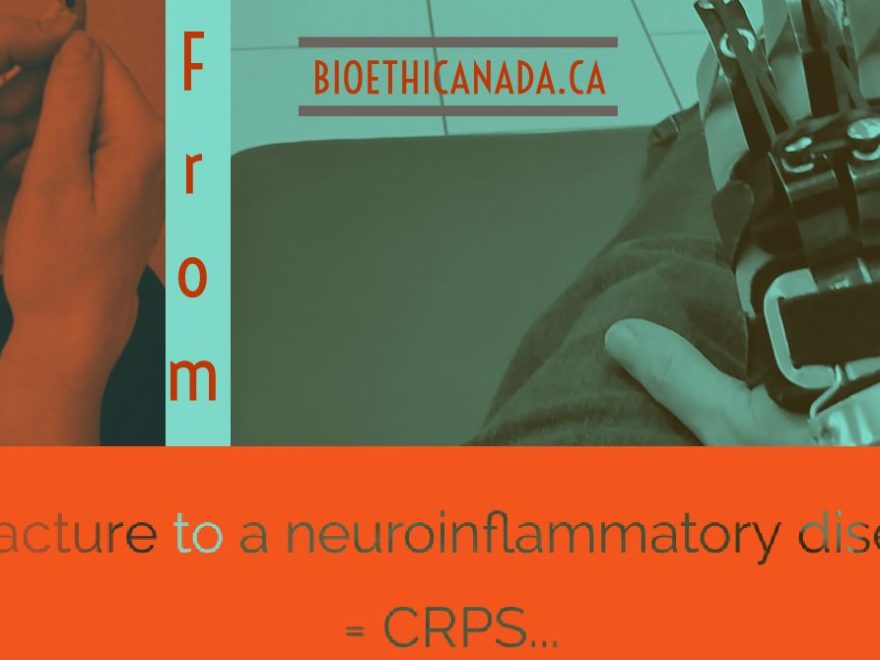While trying to come to terms with the simple fact of having a rare neuro-inflammatory disease, I’ve been doing what I always do. Trying to understand as much about it as I can. How do I do that? By reading. I’m lucky to have access to articles in medical and scientific journals, through my work in bioethics; biomedical ethics. It’s often very expensive to buy even individual medical journal articles on-line.
Having this access means that I can read some of the same information about CRPS as physicians and researchers. CRPS is Complex Regional Pain Syndrome, sometimes also called RSD for Reflex Sympathetic Dystrophy. That was its old name.

Whenever I come across a medical journal article that I think might interest someone else with this nasty disease, I’ll blog about it. I’ll post it first over on Twitter, so if you want breaking news about CRPS feel free to follow me there at @SandraWoodsMtl – or just follow the #CRPS hashtag 😉
Why am I doing this? Because I believe that patients should have access to information about their diseases. A large part of my work in bioethics has been about protecting patients’ rights. In my view, that should include having access to information about their disease. This is particularly true of conditions like CRPS, which are considered to be rare diseases.
So I’m applying my bioethics background to my new role, as a patient. It’s my way of advocating for other CRPS patients, by sharing knowledge. That reminds me of a term used in healthcare; “knowledge transfer” (KT), sometimes also called “knowledge translation”. In medicine, KT means finding ways to incorporate the results of the latest research into the creation of new – or improved – healthcare policies.
KT can also lead to the updating of clinical practice guidelines (CPGs). CPGs are the recommendations for how doctors should treat patients in specific situations. Some examples would be; under which circumstances surgery is appropriate; which medication to prescribe for which condition; and when to refer a patient for a specific laboratory test.
This is important, because clinical practice guidelines are meant to allow patients everywhere to benefit from the same level of care. In the past, before research results were available so rapidly on-line, these guidelines were often written based on what doctors and researchers believed to be the best approach. But what they wrote wasn’t always backed by science, by evidence.
This means that sometimes the older guidelines, some of which are still in use, weren’t recommending what later turned out to really be what was best for patients. A physician writing a guideline would have proposed what they thought was the best practice, at that moment in time, based on their own experience. These days, as you can tell from watching the news on any given day, our knowledge of medicine is changing almost every day!
KT is about taking all of that medical news, and then – when necessary – updating the guidelines. The recommendations that physicians follow, when treating patients like you or me. There has even been research into the best way to develop, and update, these treatment guidelines:
Extensive research has been undertaken over the last 30 years on the methods underpinning clinical practice guidelines (CPGs), including their development, updating, reporting, tailoring for specific purposes, implementation and evaluation…
Over time, CPGs have shifted from opinion-based to evidence-informed, including increasingly sophisticated methodologies and implementation strategies, and thus keeping abreast of evolution in this field of research can be challenging.”(1)
For rare diseases it can take some time for the CPGs to be updated, when new research results are published. That’s because the authors of the CPGs are generally specialist physicians, people considered experts in the medical condition. For us rare disease zebras, there are often only a few physicians who specialize in our conditions. Fewer specialists means few people available to update or create CPGs. And that sums up why I believe it’s important for patients to have access to research findings!
As always, thanks for reading. Have a happy day, and keep warm! ‘-)

Reference:
(1) Tamara Kredo, Susanne Bernhardsson, Shingai Machingaidze, Taryn Young, Quinette Louw, Eleanor Ochodo, and Karen Grimmer. Guide to clinical practice guidelines: the current state of play. International Journal for Quality in Health Care. Volume 28, Issue 1, p 122-128. Feb 2016. Online. Accessed 15 Jan 2017:
https://doi.org/10.1093/intqhc/mzv115
or
https://academic.oup.com/intqhc/article/28/1/122/2363781

